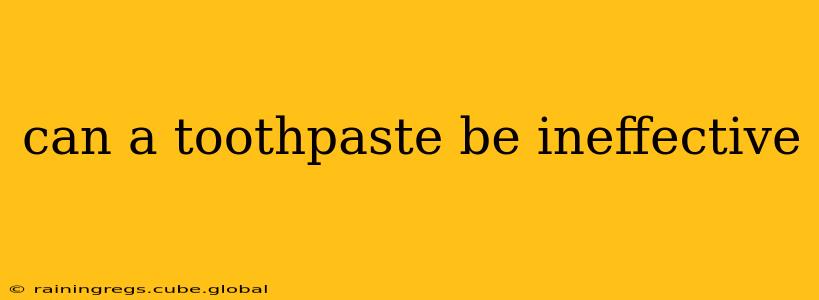Can a Toothpaste Be Ineffective? Yes, and Here's Why
The simple answer is yes, a toothpaste can be ineffective. While most toothpastes on the market offer some level of cavity protection and plaque removal, several factors can render a toothpaste less effective, or even completely useless, in maintaining good oral hygiene. Understanding these factors can help you choose the right toothpaste and maximize its benefits.
What Makes a Toothpaste Ineffective?
Several factors contribute to a toothpaste's ineffectiveness. These include:
1. Insufficient Fluoride: Fluoride is a key ingredient in most toothpastes because it strengthens tooth enamel and prevents cavities. Toothpastes with low fluoride concentrations or those lacking fluoride altogether are significantly less effective at preventing tooth decay. Many "natural" toothpastes fall into this category. Check the label carefully to ensure an adequate amount.
2. Poor Abrasiveness: Toothpaste needs to be slightly abrasive to effectively remove plaque and surface stains. However, excessively abrasive toothpastes can wear down enamel over time. Conversely, toothpastes that are too non-abrasive may not effectively remove plaque buildup, leading to increased risk of cavities and gum disease. The RDA (Relative Dentin Abrasivity) value on the label indicates the abrasiveness. Look for an RDA between 70-100.
3. Incorrect Brushing Technique: Even the most effective toothpaste won't work if you don't use it correctly. Improper brushing technique, such as brushing too hard or not brushing for long enough, can negate the toothpaste's benefits. The recommended brushing time is two minutes, twice a day.
4. Underlying Oral Health Issues: If you have existing dental problems like gum disease or cavities, simply using toothpaste might not be enough. Regular dental checkups and professional cleaning are crucial for maintaining optimal oral health, regardless of the toothpaste used.
5. Expired Toothpaste: Like any other product, toothpaste has an expiration date. Using expired toothpaste may reduce its effectiveness, as the active ingredients may degrade over time.
How to Choose an Effective Toothpaste
Selecting the right toothpaste is vital for maintaining oral health. Consider these factors:
- Fluoride Content: Look for a toothpaste containing at least 1,350 ppm (parts per million) of fluoride.
- Abrasiveness (RDA): Choose a toothpaste with an RDA value between 70-100.
- Specific Needs: Consider your individual needs. Some toothpastes are designed for sensitive teeth, whitening, or gum disease prevention.
What if my Toothpaste Isn't Working?
If you feel your current toothpaste isn't effectively cleaning your teeth or preventing cavities, consult your dentist. They can assess your oral health, identify any underlying issues, and recommend a more suitable toothpaste or treatment plan. They can also advise on proper brushing technique and other aspects of oral hygiene.
Is it possible for a toothpaste to be too effective?
While unlikely, using a toothpaste that is excessively abrasive can lead to enamel erosion, causing more harm than good. Always follow the dentist's recommendations and choose a toothpaste appropriate for your individual needs.
By understanding what factors can affect a toothpaste's efficacy and making informed choices, you can significantly improve your oral health and maintain a bright, healthy smile. Remember, consistent brushing, flossing, and regular dental checkups are essential for optimal oral hygiene, regardless of the toothpaste you use.
